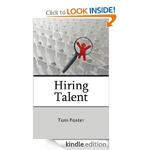Orientation for our next Hiring Talent online program starts next Monday. For more information or pre-registration, follow this link Hiring Talent – 2013.
_____
Ron settled in a chair across from Byron, his manager. We exchanged appropriate pleasantries and set the context for a conversation about the candidate pool for a new position. Byron finally drilled in.
“Ron, you know I don’t think these three candidates are qualified for the position. But you said these were the only ones who fit our budget.”
“Yep, I know things are tight around here, and figured I could save the company some money, bring in one of these people. I could show them the ropes, take them in under my wing and everything would be fine.”
“Were there other candidates that were too expensive for us?” I asked.
“Sure, we had seven other resumes, but they were no bargain. We would have to pay full boat for any of them.”
I thanked Ron for his time and he left Byron and I to debrief.
“Byron, I don’t know, but my guess is that there are seven resumes of candidates that we need to look at. So, tell me, why do you think Ron is having difficulty with this hire, looking at the wrong talent pool of people?”
Byron was troubled, but the fog was lifting. “I think Ron was threatened by those resumes that he described as too expensive. You are right. Some of the salary requirements are close to what Ron is making. And I don’t think Ron has enough perspective to truly understand what will be required in this supervisor position.”
“Byron, let me recap. This whole process started at the bottom with Irene, the receptionist, who first sorted the resumes, through another supervisor, who screened the resumes and finally to Ron, the hiring manager. None are making good decisions in this selection process.
“So, who should be driving this?” I continued, “Who is left? Who understands what is truly required and is not threatened by this hire?”
“Do you mean, me?” Byron asked.
I nodded affirmative. “You are Ron’s manager, the manager-once-removed for this role.”
_____
Just released on Kindle. The only book on hiring that blends the research on levels of work with the discipline of behavioral interviewing. The research on levels of work, pioneered by the late Elliott Jaques, is powerful science. The discipline of behavioral interviewing is the most effective method for its application. This is the only book that puts these two ideas together in a practical framework for managers faced with the hiring decision.


